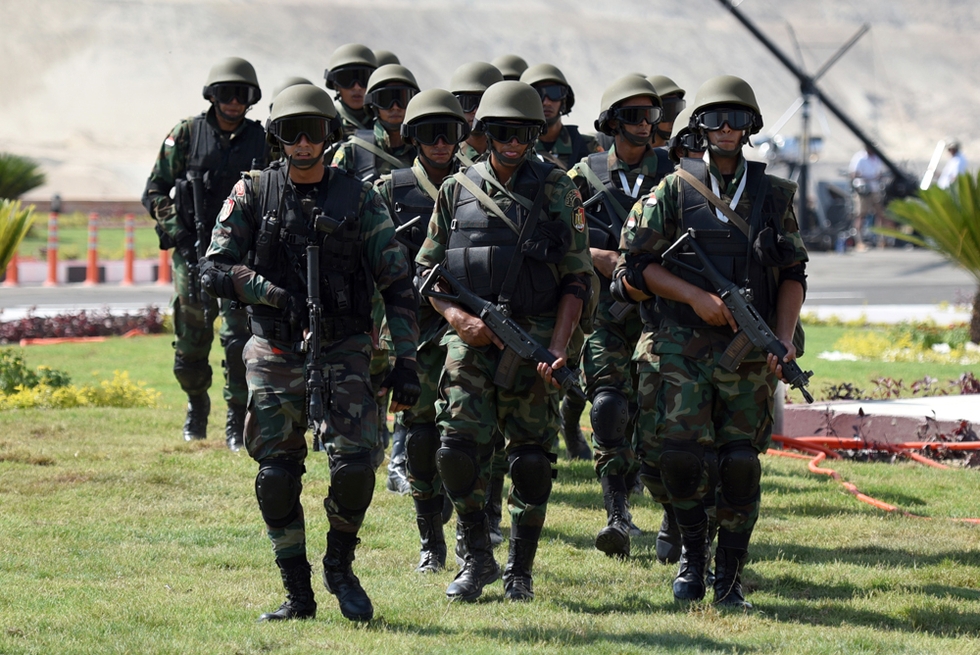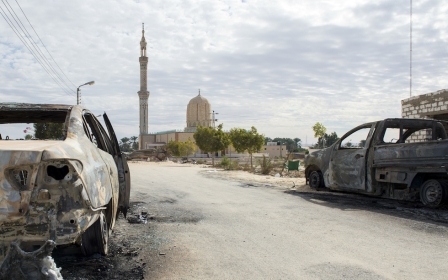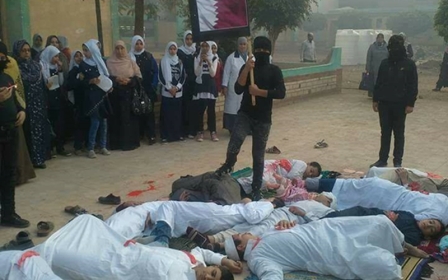Air strikes hit Sinai after 'major operation' launched by Egyptian army

New military operations, including air strikes, took place overnight in Sinai, the Egyptian army said on Saturday after the launch of a massive anti-militant campaign.
"Air forces have continued overnight targeted air strikes against terrorist gatherings and homes" in western and northern Sinai, Armed Forces spokesman Tamer El said in a statement.
The Egyptian army announced on Friday it had launched a major operation against "terrorists" in the Nile Delta and the northern Sinai Peninsula, the heart of a persistent Islamic State group insurgency.
Police and troops have been put on "maximum alert" for the duration of the operation, the army said in a statement.
"The law enforcement forces began this morning implementing the comprehensive confrontation against the terrorist and criminal elements and organisations in northern and central Sinai," an army spokesman said in a televised statement.
Forces began implementing the comprehensive confrontation against the terrorist and criminal elements in northern Sinai
- Egyptian army statement
The spokesman said the operation would tighten control of the country's crossing points with neighbouring countries.
Residents reported hearing extensive air activities above the Suez Canal city of Ismailia, which is close to the area of operations in northern and central Sinai.
According to eyewitnesses, at least 15 raids have so far have been launched by military planes over the area, with most targeting the outer parts of Arish City.
State television said on Friday that all schools in North Sinai had been ordered shut from Saturday until further notice.
The Suez Canal Authority chairman said the international waterway was operating normally.
Separately, the interior ministry said in a statement that security forces killed three suspected members of Hasm, a group that emerged in 2014 and has claimed several attacks on security forces, in an exchange of gunfire in Cairo.
Egypt accuses Hasm of being a militant wing of the Muslim Brotherhood, the country’s oldest Islamist movement, which Cairo outlawed in 2013. The Muslim Brotherhood denies any connection and says it strives only for peaceful political change.
Police also said they arrested 14 other suspected militants, whom they accuse of plotting attacks ahead of the elections, in various provinces throughout the country and confiscated a number of guns and explosives.
A resident of Arish told Middle East Eye that residents had been given little information about what to expect. He did not know whether schools would be operating for him to send his two daughters next week.
"We are in a state of total fear. We are away from the operations, but we can hear the bombs going off," said the resident who did not wish to be named.
According to the Arish resident, who did not wish to be named, bus drivers arriving in Arish at dawn informed residents that all entrance and exit points to the city had been blocked and tha all telephone lines had also been cut ommunications are cut.
"All the checkpoints are closed, and no one is allowed in or out."
His wife told MEE that people had been rushing to the markets to stock up on food items as they fear the city might come under a blockade for the coming days or weeks.
"There is no fuel allowed in the gas stations. There are no cars in the streets."
"We keep praying fearing that we will die here, but we will never leave our home," she told MEE.
The operation comes a day after Middle East Eye reported that areas around Sinai had been placed on alert and the government had called for the urgent deployment of medical resources to Sinai and the eastern port city of Ismailia.
The calls came amid an increase in military presence in the area and after Egypt imposed on 12 January a curfew on parts of the North Sinai region, including areas near the border town of Rafah.
Egypt had extended its state of emergency for three months in January to help tackle "the dangers and funding of terrorism".
In a 10-point letter - circulated through social media - the health ministry requested that hospitals across Ismailia take a series of emergency measures including doubling the number of doctors on shift and ensuring that extra medication and blood bags are available.
The letter also called on hospitals to empty 30 percent of beds in intensive care and orthopedics wards, and cancel all holidays for staff including doctors, nurses, pharmacists and technicians.
'Something is going to happen'
A large number of doctors were recently assigned to compulsory postings across Sinai after they were reportedly told by the Ministry of Health that "something is going to happen in the area in the next few days," reported Mada Masr on Wednesday.
According to the paper, the North Sinai Security Directorate recently recalled all staff members from holiday to ensure that it was operating at its full capacity, while the Arish general hospital recalled all staff who were on vacation and announced a state of emergency on Wednesday.
In a similar fashion, the Arish ambulance service announced it was on alert and instructed all of the paramedics, drivers and medical personnel who had been on a 15-day break since 1 February to return to work, reported the news website.
Egypt’s security forces have for years been battling the Islamic State (IS) group in North Sinai. IS attacks have killed hundreds of soldiers and police and has also included civilian targets.
President Abdel Fattah al-Sisi gave the armed forces three months to end "terrorism" after militants killed more than 350 people at a mosque in North Sinai in November.
Earlier this week, the New York Times reported that for more than two years, unmarked Israeli drones, helicopters and jets have carried out a covert air campaign, conducting more than 100 air strikes inside Egypt with Sisi's approval.
While Israeli intervention has helped the Egyptian military regain its footing in its battle against militants in the North Sinai, the strikes have bolstered the security of Israel's borders, reported the paper.
Stay informed with MEE's newsletters
Sign up to get the latest alerts, insights and analysis, starting with Turkey Unpacked
Middle East Eye delivers independent and unrivalled coverage and analysis of the Middle East, North Africa and beyond. To learn more about republishing this content and the associated fees, please fill out this form. More about MEE can be found here.




